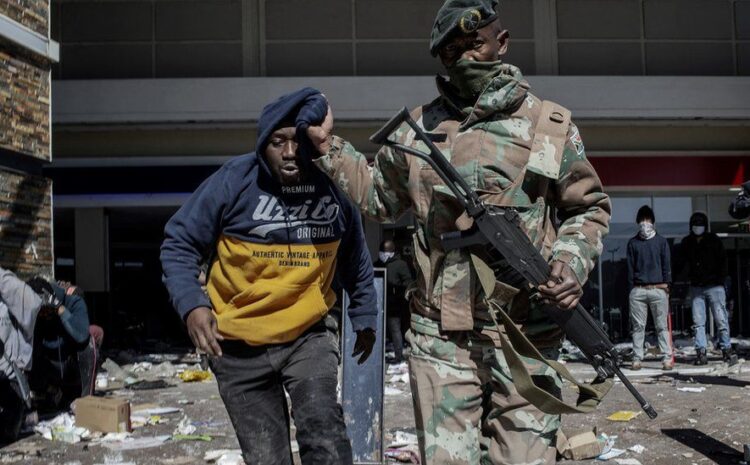
IMAGE COPYRIGHT GETTY IMAGES image caption More than 1,700 people have been arrested since disorder broke out
The military deployment – to counter riots sparked by the jailing of former President Jacob Zuma – would be the biggest since the end of apartheid.
At least 117 people have died and more than 2,000 have been arrested in South Africa’s worst unrest in years.
Hundreds of shops and businesses have been looted and the government says it is acting to prevent food shortages.
Citizens are arming themselves and forming vigilante groups to protect their property from the rampage.
More than 200 incidents of looting and vandalism were recorded on Wednesday, the government said, as the number of troops deployed doubled to 5,000.
The government has been under pressure to put more boots on the ground to tackle the unrest.
Shopping malls and warehouses have been ransacked or set ablaze in several cities, especially Durban.
“We’ve started with the clean-up but we can’t even think about the rebuild because we are not sure when the unrest will be totally done,” she said. “It’s still not safe to even go in and rebuild.”
The unrest subsided on Thursday although KwaZulu-Natal remains volatile. During clean-up operations, an additional 45 bodies were found.
Zuma’s supporters reacted furiously to his imprisonment, blockading major roads and calling for a shutdown to demand his release.
The protests descended into riots on a scale rarely seen in South Africa, with businesses in every sector looted, burnt and petrol-bombed in cities and towns across KwaZulu-Natal.
Army reservists were called to report to their units on Thursday.
The request came after President Cyril Ramaphosa warned that parts of the country “may soon be running short of basic provisions” following disruption to supply chains.
The wreckage to businesses comes as South Africa’s economy struggles with unemployment and Covid-19 restrictions.
Durban resident Lauren Alexander says the situation in the city is like a “war zone”.
“It is frightening because we don’t actually know what’s happening next,” the 26-year-old told BBC Radio 1 Newsbeat.
“Our road’s all blocked off, a lot of our food shops are closed, which frightens us a lot because we’ve got to ration our food now.”
Troops ‘too little too late’ for looting victims
By Nomsa Maseko, BBC News, Durban
Private residents armed with shotguns, pistols, garden spades and machetes have become the only defence against mobs who continue to raid areas that still have supermarkets, factories and warehouses left untouched following six days of riots in Durban.
In some areas, supermarkets that haven’t been raided are fast running out of basic supplies. Snaking queues are forming as people buy anything they can get their hands on.
We passed one shop that was shut up because it had sold out of food – though the residents guarding the area said they were hopeful of more supplies soon.
The deployment of 25,000 troops by the government has been described as “too little too late” by people who have lost their livelihoods and businesses.
They say they’ve been let down by the government’s reactive stance since violent protests began.
